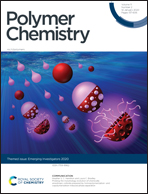Synthesis and characterization of a semiconducting and solution-processable ruthenium-based polymetallayne†
Abstract
Polymetallaynes are a special class of Wolf type-III polymers with high potential in organic electronics, especially in applications such as OFET, OLED and OPV. However, almost all reported polymetallaynes contain group 10 metals, while functional polymetallaynes with earlier transition metals have rarely been reported. Here, different synthetic routes to a group 8 polymetallayne P[Ru(dppe)2-DDBT], containing Ru(II) centers bridged in the trans-position by the organic linker 3,3′-didodecyl-5,5′-diethynyl-2,2′-bithiophene (DDBT), are explored. The polymer is obtained by copper-free dehydrohalogenation, characterized using NMR, IR and UV-vis spectroscopy, MALDI-TOF-MS, GPC and CV. In solution, CV studies show two separated metal-centered redox processes, indicating that the charge between metal centers is delocalized via the bridging ligand and a mixed-valence species exists (Kc = 102). In thin-films, P[Ru(dppe)2-DDBT] exhibits a single oxidation wave with a higher peak current intensity, consistent with a two-electron process and localized charge. Despite a degree of polymerization ∼32 based on NMR and GPC studies, P[Ru(dppe)2-DDBT] is fully solution processable, and thin-films were obtained via spin-coating using different solvents. AFM investigations of the films showed very low surface roughness, and first OFET devices with a top-gate bottom-contact (TGBC) architecture were fabricated to characterize the electronic properties, confirming the semiconducting behaviour of the polymetallayne.

- This article is part of the themed collection: Polymer Chemistry Emerging Investigators


 Please wait while we load your content...
Please wait while we load your content...